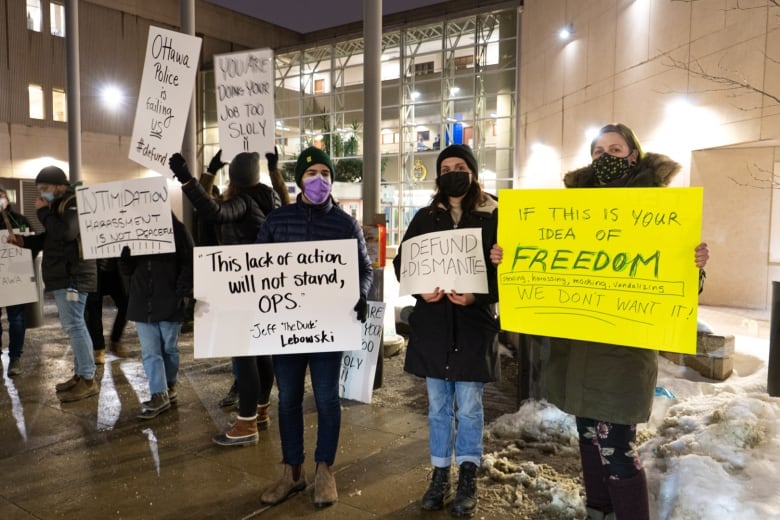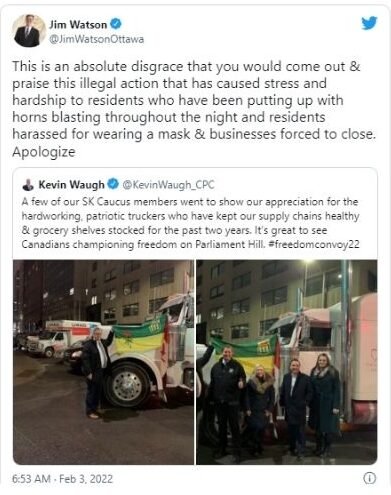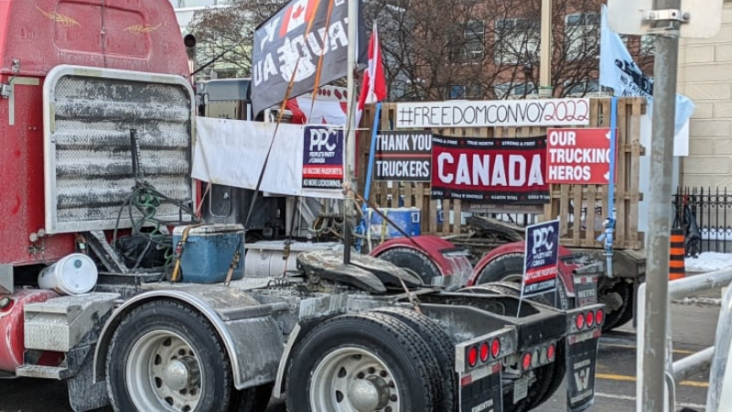
People who live in downtown Ottawa are bracing as a nearly week-long protest against COVID-19 public health mandates looks poised to continue, with the police chief concerned that policing alone may not end the “intolerable” and “unprecedented” demonstration.
The ongoing and volatile protest has spurred residents to make their own stand — at the Ottawa Police Service’s headquarters on Elgin Street.
Rhys McGaw, a downtown resident, and others gathered for a second night on Wednesday to object to what they view as inaction by police.
“In my neighbourhood, on my street, down the street, in the stores of Centretown or Lowertown — that’s where people are just running amok,” McGaw said.
“They’re looking for a fight. They’re drunk. They’re belligerent. They’re aggressive.”
McGaw said he doesn’t want to be harassed for wearing a mask and feels those flouting public health regulations are dangerous for doing so.
City councillors brought the anguish many residents are feeling to police during a Wednesday afternoon briefing.
“I’m sorry for the living hell that you’re enduring,” said Gloucester-Southgate Coun. Diane Deans, chair of the Ottawa Police Services Board, to residents.
“We live in the nation’s capital. We expect protests and demonstrations, but we don’t expect this.”

A press release from senior convoy leaders said protesters empathized with local residents, but they “plan to remain in Ottawa “for as long as it takes.”
Mayor Jim Watson said that acknowledgement “rings hollow,” and that residents have been held “hostage in their own homes.”
Later on Twitter, he went further by asking Saskatchewan politicians, including former Conservative Party leader Andrew Scheer, to apologize for supporting the “illegal action” that’s caused hardship to Ottawans.

Police considering all options to end protest
Trish Ferguson, acting deputy chief for the police force, said several hundred trucks are still in the city, and the protesters who remain are a highly volatile group.
The crowd is smaller than the thousands estimated on Saturday, but police intelligence suggests numbers are expected to swell this coming weekend.
On Wednesday, Chief Peter Sloly said policing alone might not be enough to end the protest.
“This is a national issue, not an Ottawa issue,” Sloly said. “I am increasingly concerned there is no policing solution to this.”
Sloly said options being considered include requesting military aid, negotiation, a political response, a court injunction or the forced removal of protesters. But all approaches come with significant concerns, he said, including rioting, injury and death.
Residents downtown have been abandoned during a national crisis and an occupation of our city.– Somerset Coun. Catherine McKenney
“This demonstration has been intolerable, unprecedented. The range of illegal, dangerous and unacceptable activities is beyond the ability to list,” he said.
Bringing in the military would come with its own “massive risks,” Sloly said. He said he was aware of only two such military interventions in the past hundred years: the Oka Crisis in 1990 and the October Crisis in 1970 that involved attacks by the Front de libération du Québec (FLQ).
“I don’t have a singular mandate in this city, this province or this country, to negotiate the end to any demonstration,” Sloly said. “There always needs to be an element outside of the police for any truly successful end to any demonstration, particularly one of this size.”
Daniel Minden, a spokesperson for the Minister of National Defence, told CBC the Canadian Armed Forces are not currently involved in law enforcement and have no plans to be.
The protest has involved people across the country, as well as from other countries, who are frustrated with the response to the COVID-19 pandemic from all levels of government.
The longer the demonstration persists, the more the risks will increase, said Sloly.
But clearing protesters out comes with its own dangers, he added, and police have neither the “lawful authority” nor the “practical capability” to block access to a city the size of Ottawa.
The chief also referenced similar protests against COVID-19 mandates, including attempts to contain a trucker blockade in southern Alberta.
“What happens here affects there and what happens there affects here,” Sloly said. “They were not effective and they created additional … potentially life-threatening safety issues.”
WATCH | ‘There may not be a police solution to this demonstration’
Downtown residents ‘abandoned’
Ottawa police say they’re now aware of a significant contingent from the U.S. funding and participating in the protests, while police work to thwart those efforts.
With that context, Coun. Catherine McKenney, who represents the downtown Somerset Ward, asked the Sloly if the RCMP can take over management of the Parliament Hill demonstration and let Ottawa police focus on the effect on residents.
“Residents downtown have been abandoned during a national crisis and an occupation of our city,” McKenney said.
Sloly said that was not possible, but Ottawa police are trying to support Ottawa’s neighbourhoods.
We will charge the people who are responsible for the offences no matter how long it takes and where they live.– Police Chief Peter Sloly
Police have arrested three men in connection with the protests: one for mischief under $5,000, one for uttering threats and one for carrying a weapon to a public meeting. They confirmed Wednesday the weapon was a long gun, which was seized and remains in police evidence.
There are 25 active investigations, according to Deputy Chief Steve Bell, including the desecration of the National War Memorial and complaints about harassment at the Shepherds of Good Hope.
“We are charging people,” Sloly said. “We will charge the people who are responsible for the offences no matter how long it takes and where they live.”
WATCH: Mayor says protesters doing ‘more harm than good’:
City, police searching for monetary support
Though some streets have reopened — one example being the interprovincial Chaudière Bridge — Ferguson said the remaining demonstrators intend to ensure streets that are closed stay that way.
In anticipation of the coming snow, Ferguson said barricades are going up along those streets where snow removal vehicles had previously blocked them off. The barricades are to keep more trucks from moving into some areas of the city.
It’s all costing both the police force and the city, and Deans said council has had conversations about suing GoFundMe, which has been hosting a now-paused fundraiser for the protesters.
But that legal process would take time, Deans said, and a faster solution is necessary. She also posited a federal relief package be considered for businesses forced to stay closed this week, as well as others impacted by the demonstrations.
Watson said he’s in discussion with the federal and provincial ministers to bring this about.
Blair Dunker, the police board’s chief administrative officer, said the costs of the protest have already surpassed $3 million.
For context, the Canada 150 celebrations cost $1.44 million and an average Canada Day costs around $620,000, she said.



